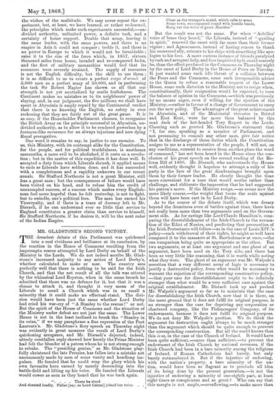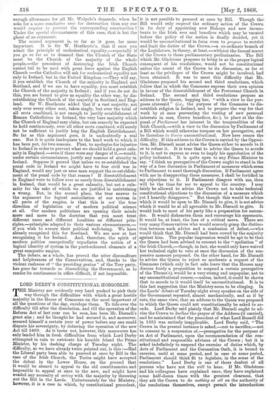MR. GLADSTONE'S SECOND VICTORY.
THE dreariest debate of this Parliament was quickened into a real vividness and brilliance at its conclusion, by the reaction in the House of Commons resulting from the impromptu rescue attempted by Lord Derby on behalf of the _Ministry in the Lords. We do not indeed ascribe Mr. Glad- stone's increased majority to any action of Lord Derby's, whether calculated to make or mar. The country sees perfectly well that there is nothing to be said for the Irish -Church, and that the net result of all the talk was uttered by the whimsical Lord Royston, when in the same breath he -admitted that there was no defence for it, but that it was a shame to attack it, and thought it very mean of the Liberals to assail a Church which was in so small a minority that it could make no effectual stand. The divi- sion would have been just the same whether Lord Derby had cried his war-cry of " A Stanley to the rescue!" or not. But the spirit of the House of Commons and the situation of the Ministry under defeat are not just the same. The Lower House is not in the least inclined to brook the " Stanley in its veins," if we may paraphrase a fine expression of the Poet Laureate's. Mr. Gladstone's fiery speech on Thursday night was evidently in great measure the result of Lord Derby's quickening arrogance, and Mr. Disraeli's dejected, indeed, utterly crestfallen reply showed how keenly the Prime Minister had felt the blunder of a patron whom he is not strong enough to rebuke. The " presiding genius," as Mr. Gladstone play- fully christened the late Premier, has fallen into a mistake not uncommonly made by men of some vanity and headlong im- pulses. He fancied that he could reap the glory which his own favourite hero earned by merely descending into the battle-field and lifting up his voice. He fancied the Liberals would cower as soon as they heard that he was back again.
. . . . There he stood And shouted loudly. Pallas [say, as Lord Cairns] joined her voice. . . Clear as the trumpet's sound, which calls to arms Some town, encompassed round with hostile bands, Rang out the voice of groat ,acides."
But the result was not the same. For when " Achilles' voice of brass they heard," the Liberals, instead of " quailing in spirit," renewed the onset with far more than their former vigour ; and Agamemnon, instead of having reason to thank his recovered ally, retreats to his ships with something like apo- logies to his foes. A more curious instance of friends paralyzed by rash and arrogant help, and foes inspirited by it, could scarcely be, than the effect produced in the Commons on Thursday night by the onset of Lord Derby in the House of Peers on Tuesday. It just wanted some such idle threat of a collision between the Peers and the Commons, some such irresponsible advice to the Queen to refuse a reasonable request of the Lower House, some such dictation to the Ministry not to resign when, constitutionally, their resignation would be expected, to turn the balance of opinion in the Commons,—which was previously by no means eager, even if willing, for the ejection of the Ministry,—rather in favour of a change of Government to carry out the new policy. The advantages of the great achievement in Abyssinia, and of the Ministerial victories in Bristol and East Kent, were far more than balanced by this mad dash of the hot-headed Tory Rupert in the Lords. Cheering such as greeted Mr. Gladstone's statement that "I, for one, speaking as a member of Parliament, and not presuming to commit any other man, give fair notice that in the discharge of those duties which the Constitution assigns to me as a representative of the people, I will not, on any conditions, consent to receive from another place the word of command," has not been heard in the House since the con- clusion of his great speech on the second reading of the Re- form Bill of 186G. Mr. Disraeli, who understands the House well, evidently thought it hopeless to attempt a rally of his party in the face of the great disadvantages brought upon them by their former leader. He clearly thought the time more convenient for a tone that would soothe rather than challenge, and obliterate the impression that he had suggested his patron's move. If the Ministry resign,—as seems now the more likely course,—the weight that turns the scale against them will have been cast in by Lord Derby.
As to the course of the debate itself, which was dreary beyond the dreariness even of battles against time, there have not really been more than two arguments used on the Govern- ment side. As for ravings like Lord Claude Hamilton's, com- paring the disestablishment of the Irish Church to the revoca- tion of the Edict of Nantes, and predicting that persecution of the Irish Protestants will follow—as in the case of Louis XIV.'s policy—such withdrawal of their rights, he might as well have compared it to the massacre of St. Bartholomew at once,—the one comparison being quite as appropriate as the other. But two arguments, or at least one argument and one ghost of an argument, have been used on the Tory side, and there has been so very little like reasoning, that it is worth while noting what they were. The ghost of an argument was Mr. Walpole's assertion that a very different array of logic is necessary to justify a destructive policy, from what would be necessary to warrant the rejection of the corresponding constructive policy, —that your case for disestablishment ought to be infinitely stronger than what would be a very sufficient case against the original establishment. Mr. Disraeli took up and pushed Mr. Walpole's argument so far as to maintain that the case for disestablishing the Irish Church, now that it is there, on the mere ground that it does not fulfil its original purpose, is no stronger than the case for depriving any corporation or chartered company, like the Fishmongers' Company, of its endowments, because it does not fulfil its original purpose. We do not deny Mr. Walpole's position. We do think the argument for destruction ought always to be much stronger than the argument which should be quite enough to prevent the corresponding construction. But all the world knows that this is so, in the case of the Church of Ireland. It would have been quite sufficient,—more than sufficient,—to prevent the endowment of the Irish Church by national revenues, if the Irish Church had been in a bare minority among the religions of Ireland, if Roman Catholicism had barely, but only barely outnumbered it. But if the injustice of endowing, with the nation's property, a bare minority of the na- tion, would have been so flagrant as to preclude all idea of its being done by the present generation,—is not the injustice of endowing a minority of one-eighth part, at least eight times as conspicuous and as great ? Who can say that this margin is not ample,—overflowing,—to make more than.
enough allowances for all Mr. Walpole's demands, when he asks for a more conclusive case for destruction than any one would require to prevent the corresponding construction ? Under the special circumstances of this case, that is but the ghost of an argument.
The second argument is, so far as it goes, far more important. It is Sir W. Heathcote's, that if once you admit the principle of ecclesiastical equality,—especially if you go so far as to demand that the Church of the State must be the Church of the majority of the whole people,—the precedent of destroying the Irish Church cannot fail to be used with great force against the English Church :—the Catholics will ask for ecclesiastical equality not only in Ireland, but in the United Kingdom :—They will say, if you establish the Church of the majority in England and Scotland, and if we are to have equality, you must establish the Church of the majority in Ireland ; and if you do not do this, you are bound to give us equality the other way, by dis- establishing the Church of the majority in Scotland and Eng- land. Sir W. Heathcote added that if a vast majority, not only over every other sect, taken singly, but over the total of all sects combined, is not enough to justify establishment of Roman Catholicism in Ireland, the very bare majority which the Church of England may claim, but can scarcely be expected to hold continuously, over all other sects combined, will surely not be sufficient to justify long the English Establishment. So far as this argument goes, it is undoubtedly a real one. But it is quite inadequate to the hard work to which it has been put, for two reasons. First, to apologise for injustice to Ireland in order to prevent what we should hold a great cala- mity in England,—even if there were any danger of it,—would, under certain circumstances, justify any manner of atrocity in Ireland. Suppose it proved that unless we re-established the penal code in Ireland we might have to fear civil war in England, would any just or sane man support the re-establish- ment of the penal code by that reason ? If disestablishment in .England were to follow ever so surely from disestablishment in Ireland, that would be a great calamity, but not a cala- mity for the sake of which we are justified in maintaining s, wrong. But, in the second place, the true answer to the argument for logical assimilation of our system in all parts of the empire, is that this is not the true direction of legislation or of modern political science at all. Our ,modern politicians are opening their minds more and more to the doctrine that you must treat different races and different localities on different prin- ciples,—principles adapted to their various circumstances,— if you wish to secure their political well-being. We have already recognized this for Scotland. We are now at last recognizing it for Ireland. And, therefore, the spirit of modern politics energetically repudiates the notion of a logical identity of system in the parti-coloured elements of a great composite empire.
The debate, as a whole, has proved the utter discomfiture and helplessness of the Conservatives, and, thanks to the violent rashness of " the presiding genius " of the Tory party, has gone far towards so discrediting the Government, as to render its continuance in office difficult, if not impossible.



































 Previous page
Previous page